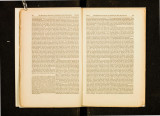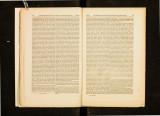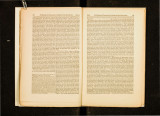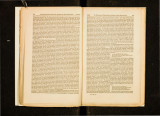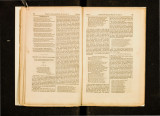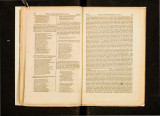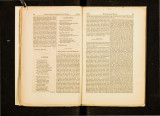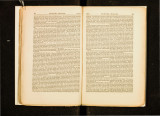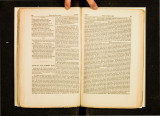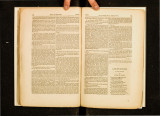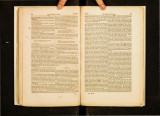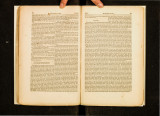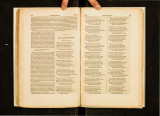| OCR Text |
Show I 460 Tl1e .Afassaclmsells Proposit;on for Abolishing tl1e Slave Represen!Glion. [AuGUST, interfere in the emancipation of slaves, or in the well ha\'C been more deliberate and solemn. If treatme11l of them in any of t/1e Stales-it remain- Ma ssac hu~eus has ch:1.nged her opinion of the Coning with the seceral Stales alone to pro\· ide rules stitn tion, she has no rig ht to expect other States and regulations therein, ~\· hich humanity and true to follow her example. Until the Constitntion is policy may require ." altered, J\ las!?achuselts is bound to fulfil C\'ery duty Among- others who have expressed similar views, which that instrument requires from her citizrns. the Southern people recollec t the emphatic \\'Mds No new views of liberty, rw feelings of phibnuuert> d bJ Mr. Daniel \\"ebstf'r in 18 10. ''I say. thropy, no new scr uples nt' n!l igi nn, will constitute that stand in~ here, (remcuked 1\lr. \V. ,) in thr. a legitimate defence for the di rect or indirect \'iocapitol of \ "i rginia, beneath an October sun, in the lation of her plig-hted f.1ith and lwnor. midst of th is assen.blagc, before the entire countr)', Tn a speech deli1·ered in the lli mse of RPpreand npon all the respon sihil ity whieh Uelongs tn se utati\'eS, in January 18 10. hy l'. l r. Slade, of Verme, I say, that there is no po\\"er. direct or indi mont, now f:o1·e~nor of that cornmoii\I'C;llth, he TPctr in Con!!ress or the Gene r:.d Governmf'nt, to used rhe folluwiu:.r l.lll;,! nage. ·• By coming- into interfere, inlAe shg!ttc.fl degree, with the in stitu - the Un ion. thH North rn :tde sla\"ery in a se nse irs lions of the South ." Tt'n years ht>furP. in a specr-!1 own-that is. to the exterH uf the f'XIlrf'SS stqlllla.which he mad e in rf'ply to Mr. Hayne of South tious to whir·h I ha\'e refcrrerl. '' A!!ain. ''in cHlopt· Carnlina. ~1 r. \\'pbster used rt.is lant!uagt> : ''Tin> in~ the Constit ution, the N••rrh entPred into a st ipudomestic slnvery nf the Suuth. I le:n•e 11here I latiou to de!r 1·e r up f,tgitt"f's.·• \\"p ltt•pe l\lr. find it-in thi! hnnrls nf t!. eir nwn (~m·f:>rrHIIPnt s. Slade will kePp these rrurhs iu renH'mbr:Hwe, and It is llteir o_f!air. nut mint' ... In 1."!10. he reitera- 1' '\ l' rt hi;; Pnergies in itul•rt.'-"SIII!! them upon the ted the ser11iment. and added, ••l!told that Con- minds uf Northern me n. Tile ~urth t·errainly did gress is ahsolntely preeludt>cl from interfering in ent f> r '• intn a stipulation tu deliver up fu git ives," any m•wner. direct or indirect, with tlois, as with a nd tltlt provision of the Federal Constitution reany other uf the institutions of the South." The f'ei1·ed the unnnimnus snppurt of the l''eJc ral ConSouthern peirple coincide with a distinguished son ventwn. In 1703, Congress, apprecia.ring rhe duty of l'\'lassachuserts in these opinions. of affording- protec·tion to the rights of the citizens Thf'y r:oncede rltat it is" the right of the people of slave-!tolding States, passed l Jaw to enalt!e peaceahly to 'lsseml1le and If• petition tlte Co.,ern them to rf'co1·er tllf'ir fugitr1'e sla\'f'S. The people menr ftrr a redre~s of l!rie.,ances ;" hm they con- nf the non. sla1·e ltnldin~ StatPs knew tlren and tend th at slavery is" their affair," and not a ~riev. know now, th :ll the Federal Go\·ernment possesses 11.nce to the North; that Congress lt:ts no right to rhe exC'Iusi\'e right to r~>gulate the manner in whir:h ]Pgislate on the suiJjt'Ct; that the citizens of the the'· claim" of a master to his fngiti1·e slave ~;ha.ll free States ahuse and per\'ert the right of petition, be made; and they I• now further, that all St1te and by invoking le~islatil'e action, are seeking to legislation, whic h, Jireclly or indirectly, limits or use the Government a!> an eng-ineofagi:ationd:ul· restrains the right of reco\'ery of fug-iri1·e slaves gerous to the peace of the South, as welt as to the (on ·' rlaim" as defined and prE>scrihed by the Jaw perpe!uity of tlte Union. Unless the Union itself uf Congress, is utterly null and \'oid. The Southbe a gric\·ance to the people of the non-slave. ern pec•ple, having the constitutioual rig-ht to reholding Stnte!', we do not see why th~y should co1·er their fugiti\•e slaves, nnd Congress having complain of slal'e ry, as they have necessarily no provided a metltod to enforce that right, it unquesconnexion with it, sa\'C through the pro\'isions of rionab!y became the Jury of l.he non-s'ave·holding the Con!l.titution of the United States. ~tares to intPrpose no frhsta('le to the certain and In ratifying the Constitution, the people of 1\fas. prompt execution of a la.w em:~ nating from a Go\'sachusetts, as we!! as those of the other States, ernment, the laws of which are the supreme law gave their assent to e\·ery part. of the Constit11tion, of the land. To prevent the enf4,rcement of the and hound themselves to comply faithfu!ly with all law providing for the reco1'ery of fugiti \'C .sla.ves, the obligations which it imposed upon them. The by clamor, menace, or vinl ence, is to nullify an act 1\hssachusells Convention declared that its mem- passed in C'onformiry with one of the plainest probers," having impartially discussed and fully con- visions of that Constitution, to which the nonsidered the Constitution," were wtlling to rarity slave-holding States have given their deliberate the same, "acknowledging, with gr:~teful hearts, 3nd well -considered assent. In substance, it is the goodness of the Supreme Ruler of the Uni- equivalent to saying," it is true, that we cit1zens verse, in affnrding the people of the United States of the nno-sla1·e-holding States are bot1nd by the an opportunity, deliberately and peaceably,witltout Constitution and laws passed in pursuance thereof, fraud or surprise, of entering into an explif'it and· to restore to you your fug-itive sl:tves, but we besolemn compact with each other, hy a~scming to lie\'e slavery to be sinful, and th erefo re, we will and ratifying a new Constitntinn, in order to form not obey the requirements of the Constitution and a more perfect union, establish justice, insure do- Jaws in this regard, but should Congress pass any mcslic traniJuillity," &c. No ratifi cation could laws which will advance the interests of the Nurth, 1845.] The jlfassachuselts Proposition for Abolishi11g lhe Slate Represtulalion. 461 you Southern men must not obstruct their enforce- thenriea of social happiness: nor does morality ment, and if you do, we will denounce you, and teach us th a.t we do rigbt when we deprive (our fclurge Congress to pass a law coercing you into low-citizens of that which the laws recognize as submission at the point of the bayonet. \Ve will property. "Stranger, tell the Lacedremonians, not iucur the odium of nullifica.tion. Uy calling a that we lie here, in obetlienre to their laws," was State Convent inn, and passing an ordinance selling the brief inscription to commemorate the !teroic aside the law in relation to fugitil'e slaves, but we devotion of Leonidas and his faithful band at Therwill accompli :>h the same end lty resorting to legal mnpylre. Those gallant men had not only been quiUltles. mob ordina11ces and other expedients obedient lo the la\rs of their couutry, hut the crownwhich we ha\·e ofien enrp!oyed with entire sue- ing act of their patriotism was, that they were obecess." \Virh truth, might I\'l irabeau say, that \\"Ords client e \'en unto death. Dee ply do we regret, that w~:re thing-s, for the history of the world aiTurds tbe people of J\lassachu se lts and or her States are many striking exemplifications. so little tli spnsed ln folluw an exa mple, which does ln aiding and ahelling the escape of fugitive honor to huruan nature and sheds lu stre on the hissl:: ives from time to tiwe, tlre citiz ens of the non· torie page. slave-holding States thus engaged, have t~o ntempt· Mr. \Vinthrnp, of Ma.'>sachusetts, recently ob· uous!y disregarded the injun ctions of the Cousti- sened in the !louse of Representatil'es, that" it turiun, violated the suprerne law of the land, and would be wt·ll fur us to have some remembrance manifpsr ed their want of respect fur the rights of of what were the opinions of our ancestor8 on this their :Southcm brethren. Nut content \\ith with- qnestion of sla1·ery." Jfc was right. The npinhulding th eir f•oUper~tion in enfureing the law of ions of our arwestors are not sufficiently heetled 1 Con~ress, dtsdaining to be passive, citize ns of the and they should at all rimes command our respect. free .States hare again and again openly denounced Our ancestors were intimately acquainted with the tlte law, excited a ;;;pi rit of oppositit•n, aud by cia- Bible, as well as the science of Government; they mor nr force, e1'asion or fra.ud, sougltt to rend er it were as patriotic as any of the ir descendams, and perfec tly inoperati\'c.• To aid a fugitive slave in not less de\'Oted to Libe rty; llut being practical making his escape i.s regarded as praisew<rrrhy, to men, and nut speculative philosophers, they thought arre.3t him, criminal, by those, who unmindful of it rigltt and proper, that fugitive sla\·es should be their constitutional obligations to others, are espe- surrendered up to their masters, and that the Slavecially carefu l to see that those powers by which holJing States should enjoy representation for threethe Federal Go\·ernrnent can benefit the North, fifths of their s]a\·e population continually. If, for shall be fully exercised and perse1·eringly main- avowing anJ carrying into effect these opinions, tained in despile of all opposition. No c:1ndid and "our ancestors" were guilty of tr e:~son, then let intelligent citizen of the free States will deny, that their Massachusetts descendants make the most the security of the rights of property is ont of the of it. most important objects for whieh government is in- "Why. unless from the love of agitation and misstitnted. That the Constitution, in authorizing the chief, did Messrs. Adams and Giddings, in draw· reco1·ery of fugitive slaves, recognizPs them as ing up their Report upon the l\'Iassachusctts propoproperty, is equally true and iucontrovertible. Re- si tion, leave their designated path of dnty 1 and atspect for the rights nf property, and perfect obedi- tempt to prove, that sla\·ery was condemned by cnce to the laws desigued to enforce those rights, the Christidn Religion 1 The_v had been appointed are among the highest obligations of e\·ery A mer- rnem!Jers of a committee to consider a prqposition ican citizen. H.eligious scruples or spee~!atil'e for an~endin~. the Con~titutiun in respect t_o rf'p~eviews of hum:w riuhts a!Tord no valid around uf sentatton. l he CjUestwn had no conn extOn \\'lth opposition to the Ja1~'S of the land, since ;en differ religion, and the House of Representatives had not widely as to human rights and equally as to the directed the commit~ee to enquire w~•;th:r r:ligion true interpretation of the Bible. Anarchy, discord condemned or sanctroued sla\·ery. 1 hetr l'tews of and rew•lution arc the consequences of a!lowinu this question were not asked by Congress, nor deea..: h intli\•idual to obey or disobey the Jaws, a~cord~ sired by the country. ThPy may ha\'e rcg~rded ing to his perception of right or wrong. Religion themseh·es as the organs sele~red Uy the ~lmrghty does not command us tn bid defiance to the Jaws of to expound his word and en lr ghten mankrud as to the land in order that individuals may test their sin and slavery , but if such a view were taken, the 1 people of the United States would like to examine *The Commiltef'", of\\hich Ch~rles F. Adams was Chai r- their credentials. \Vhen, before, in the history of man, introduced a trill prohil.titing any j11stice of the peace, our g-overnment, did the members of any commitand any jnrlge of a State court of Massacht<-~t>tr~. from tee of Congress ever suUmit a Rrport in which an granting 11 cer.tifintte_ i_n ral'es ari sing unJ('~ t~t~ law of Con· institution, pervading one half of the S tates of the pess. respeeung fug:tn·e sLn·es; :md prolulllltn~, lty a firrf' Union was uratuitously assailed and denounced for of 81000, al l the sheriffs, constable,., coroners, ptlors and ' "'. . 1 other officers from arresting, or ait.lillg in the arrest of any a su~posed vwlatl(ln of the law of God . person daimed as a fugiti1·e sian·. \Vtth what consistency or grace John Quincey |







